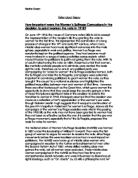It was the militant suffragette campaign, more then any other factor that led to the achievement of female suffrage in 1918. How valid is this view?
“It was the militant suffragette campaign, more then any other factor that led to the achievement of female suffrage in 1918.” How valid is this view?
In 1918, women over the age of thirty gained the franchise. It was however, another ten years before women gained the vote on equal terms to men. Many historians continue to debate what the main factor was which led to the achievement of female suffrage. Some would argue that the militant suffragette campaign brought the issue into the public eye. Other historians claim that the peaceful tactics of the suffragists did more to persuade politicians that women should have the right to vote. However, another important factor to consider is the contribution made by women during World War One as this demonstrated how important women were and how much they deserved the vote.
The suffragette movement was born in 1903 when Emmeline Pankhurst decided to break away from the suffragist movement. She had become frustrated with the peaceful methods of the suffragists and felt it was getting them nowhere. She and her daughters Sylvia and Christobel formed the WSPU (Women’s Social and Political Union). The WSPU later became known as the suffragettes. Some historians believe that the suffragette movement was the biggest factor in winning votes for women because they brought the issue into the public eye. Their militant actions meant the press wanted to report on the issue more. The suffragettes would heckle MPs, break shops’ windows and chain themselves to railings to get across their point. While in prison for breaking the law, the suffragettes went on hunger strike for political prisoner status. The public were horrified when they heard the government was force feeding these women and they won public sympathy. During the years between 1912 and 1914, the suffragettes slashed paintings, cut telegraph wires and firebombed homes and businesses. Emily Davison jumped in front of the king’s horse and in sacrificing her life for her beliefs she became a martyr for “the cause”.







